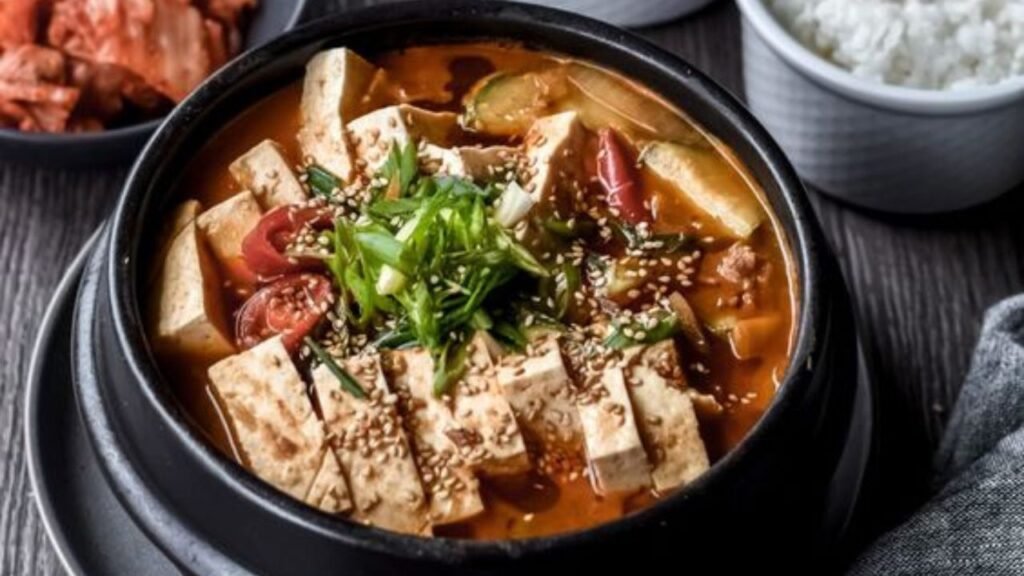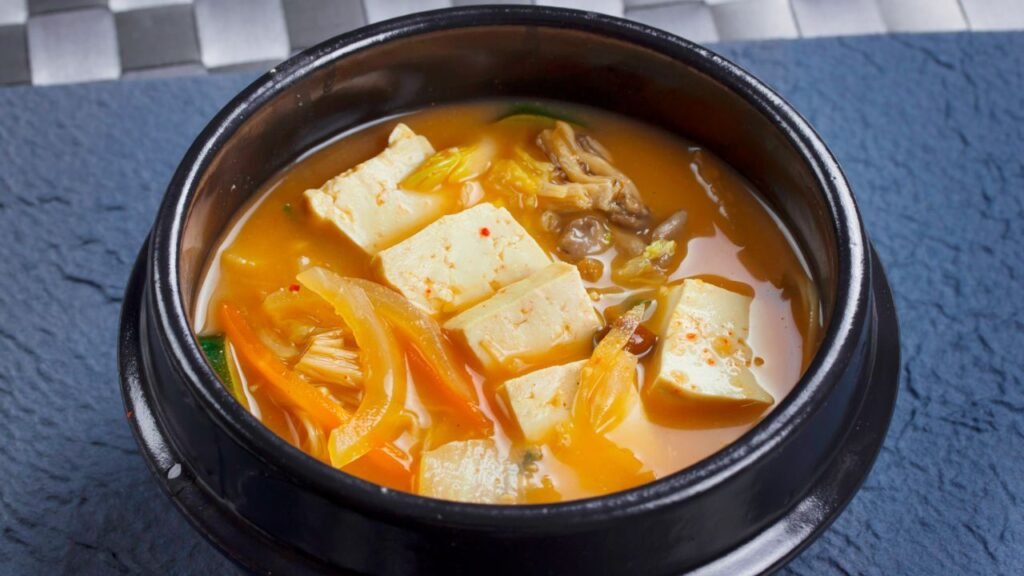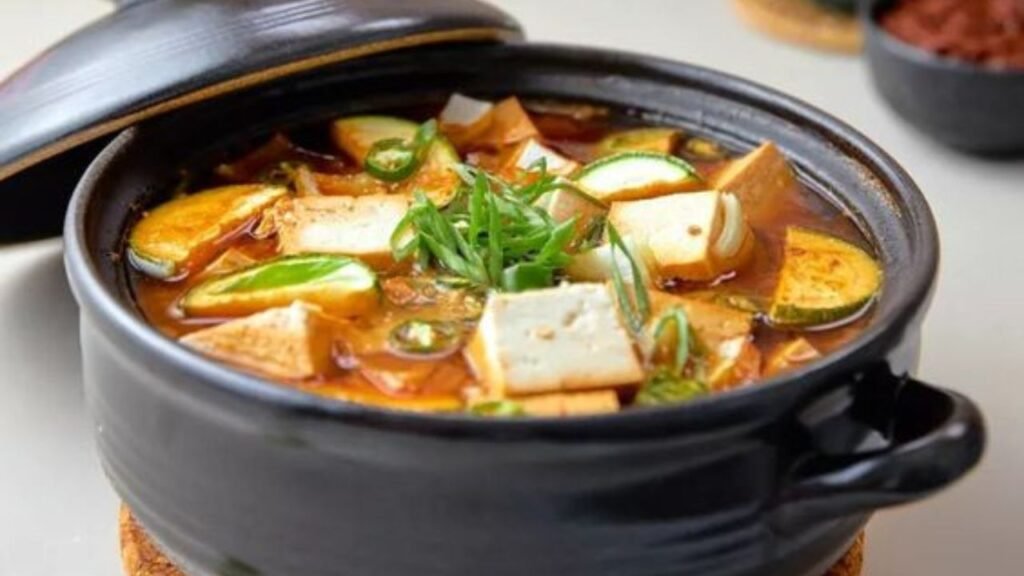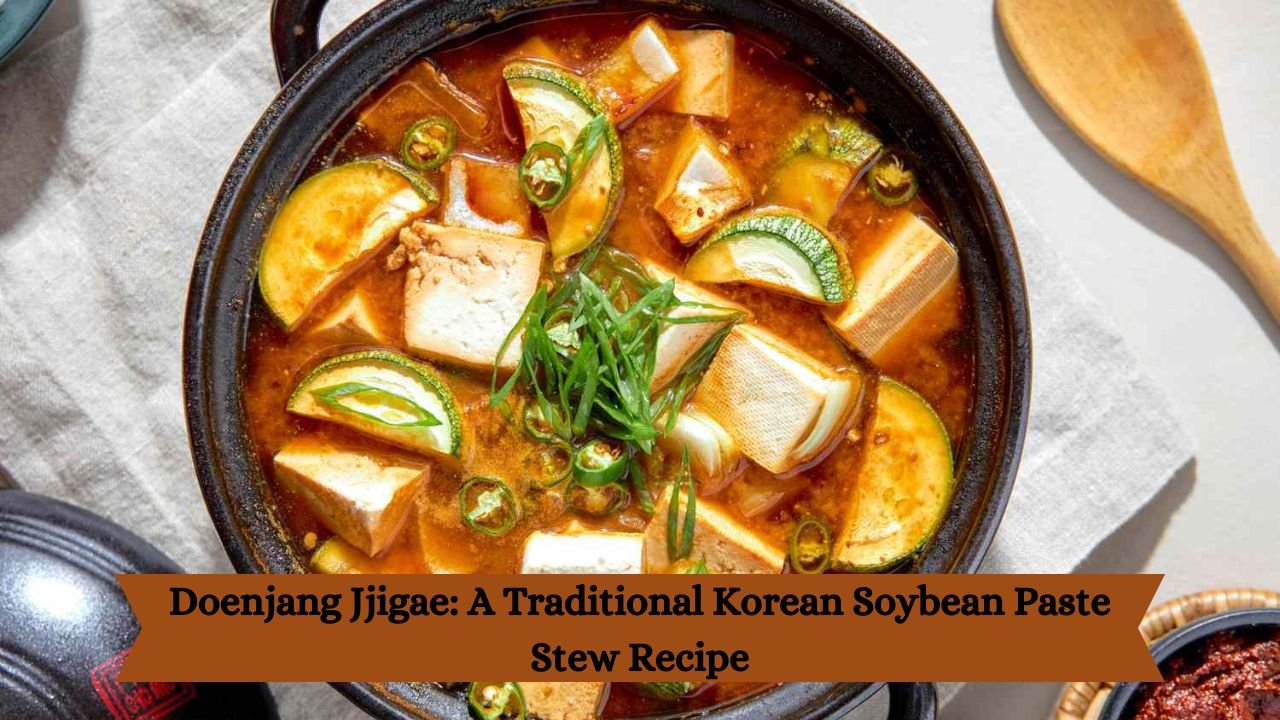Introduction
Doenjang jjigae is a Korean stew with soybean paste; this is one of the most basic, fantastic Korean dishes. While it’s hot, it’s delicious, plus very yummy; very real to the Korean home cooking essence. This stew is so delicious, but again, it’s also very easy to prepare. It contains umami-filled ingredients which are very beneficial for health.
This dish brings out the deep and fermented flavor of Korean soybean paste, called doenjang. It can be customized with different vegetables and types of proteins. Whether you’re new to Korean cuisine or a seasoned lover, Doenjang Jjigae is a dish you must try. It will warm your heart and delight your taste buds.
Donjang jjigae is not only a simple food, but it also reflects the warmth and love of home cooking. When you create it and share it with your family or friends, it will make your relationships even stronger. Try it once, and you will be in love with its amazingness.

What is Doenjang Jjigae?
Donjang jjigae, or the way it is spelled as 된장찌개, is one of Korea’s top favorite stew dishes. It is made from Korean soybean paste called doenjang. Donjang is a fermented bean paste prepared using soybeans and brine.
This stew is usually prepared by mixing a special soup stock, meat (or fish), tofu and vegetables of your choice. The most popular vegetables in the region include zucchini, potatoes, onions and Korean or daikon radish.
Donjang Jjigae not only tastes amazing, but it is also easy to make. It is hot and delicious, which warms your heart in the cold weather. When you make it, you can share it with your family or friends and hear their appreciation too. Umami is experienced in every bite, which makes it special.
Ingredients
- 160g / 5.6 oz Beef brisket or any cut suitable for soups and stews, thinly sliced (preferably paper thin) and cut into bite-sized pieces
- 2 Tbsp rice wine (mirim)
- A few cracks ground black pepper
- 3.5 cups rice water, obtained by rinsing rice
- 3 Tbsp doenjang (Korean soybean paste)
- 1 Tbsp ssamjang (Korean spicy dipping sauce)
- 2 tsp gochugaru (Korean chili flakes)
- 1 tsp minced garlic
- 100g / 3.5 ounces potato, thinly sliced
- 90g / 3.1 ounces zucchini, thinly sliced
- 35g / 1.2 ounces onion, thinly sliced
- 100g / 3.5 ounces enoki mushrooms, stems removed & separated
- 45g / 1.5 ounces shiitake mushrooms, thinly sliced
- 250g / 8.8 ounces tofu, sliced into medium rectangle pieces
- 20g / 0.7 ounces green onions, thinly sliced
- (optional) 2-3 chilies (green and red), thinly sliced

Instructions
- Combine the beef with the rice wine and black pepper in a bowl. After mixing them well, heat a medium-sized pot on medium-high flame for some time.
- When the pot is hot, add the meat and stir it. Since there should be some fat in the meat, you won’t need to add oil to the ingredients.
- Fry it until it turns brown. After about two minutes, add the potatoes and mix them as well.
- Pour water over rice and then boil it. For dipping, use doenjang (Korean soybean paste) and ssamjang (Korean spicy dipping sauce). This will help dissolve the ingredients. Add kochugaru (Korean red chili flakes) and garlic. Stir well.
- When the water starts boiling, add the zucchini and onion. Boil for a minute. Then add mushrooms and tofu and cook for a minute.
- Next, add green onions and chillies and simmer for another minute. Then remove from flame.
- Serve steamed rice with Korean side dishes. Side dishes shown above include Korean egg rolls, pickled seaweed, and radish kimchi.
- These vegetables and other ingredients make your food even tastier.

Tips for Perfect Doenjang Jjigae
- Quality Doenjang: To achieve rich flavor, use high-quality fermented doenjang. About its flavor, it should have a rich and deep character. Its aroma must also be complex.
- Customise Your Vegetables: You can customise this stew by adding seasonal vegetables like carrots, radishes or spinach as per your choice. This depends on your choice or the ingredients you have.
- Protein Options: It is really so easy and straightforward to add in any of your favorite proteins. Do just keep an eye on them as cooking times may vary.
- Spice Level: If you prefer the chilies spicier or milder according to your taste, add less or more of gochujang and green chilies, respectively. This way you can make the dish delicious according to your preference.
Health Benefits
Donjang jjigae is very delicious, but it is also very nutritious. Doenjang contains a lot of protein and fiber, which houses many vitamins and probiotics that can help promote health in your digestive track. Additionally, the vegetables it contains provide essential vitamins and minerals. Additionally, tofu is an excellent plant-based protein source.
Thus, donjang jjigae is not only a delicious food, but it also provides much-needed nutrition to your body. Eating it can improve your digestive health and provides you with freshness and energy.

Serving Suggestions
The true taste of donjang jjigae comes when served extremely hot and fresh, accompanied by a big plate of white rice. Kimchi, pickled vegetables or your favorite banchan (Korean side dishes) also make a great combination with this delicious stew. With these side dishes, the joy of this traditional dish is enhanced, making the meal even more special and satisfying.
Conclusion
Lately, donjang jjigae has become the most loved and sought after dish in Korean homes due to its deep and warming characteristics other than their characteristic flavor. It is easy and flexible to prepare so it is an ideal dish for whatever level of cook, be it novice or a veteran chef.
This traditional soy bean paste stew will bring joy to your table, whether you eat it on a cool day or choose it as a comfort food any time of year. Try experiencing the true taste of Korean food by making donjang jjigae in the comfort of your home. It will not only give you the true taste but will also create a special memorable moment for your family and friends.
FAQ’s
For what use is doenjang soybean paste?
A mainstay of traditional Korean cooking is doenjang. In Korean cuisine, it finds great usage as a base for soups, stews, and noodle meals as well as in dipping sauces and condiments.
Why is doenjang jjigae healthy?
Doenjang’s fermenting nature results in significant concentrations of bioactive substances including saponins and isoflavones.
Taste of doenjang?
It tastes sharply salted, umami, with a chunky consistency.

